
Poker is a card game that can be played by two or more players. It is a game of chance, but also involves bluffing and psychology. It is an exciting and addicting game that can be played for money or simply for entertainment. However, before you start playing poker for real money it is important to understand the rules of the game.
A standard deck of 52 cards is used (although some games may use multiple packs or add jokers). The cards are ranked from high to low: Ace, King, Queen, Jack, 10, 9, 8, 7, 6, 5, 4, 3, 2 and a wild card which can be any card and breaks ties.
When a player bets, they must put up at least as many chips into the pot as the player before them, or “call.” If their hand is strong enough they can raise the amount of the bet, or “raise.” They can also fold their hand and discard it, or “drop” and leave the betting round.
The highest-ranking hand wins the pot. The other players can bluff and try to win the pot with weaker hands. However, if they don’t have a good hand, they can lose all of their money and possibly get banned from the game.
There are a few things that you can do to improve your poker game and make it more profitable. One of the most important things is to learn how to read your opponents. This includes understanding their mood shifts, reading the way they hold and move their chips, the time they take to decide how to play, and their general body language. Another important thing to do is to play only with money you are willing to lose. This is especially true while you are learning to play. If you have a plan in place to manage your bankroll, you can avoid going broke and stay in the game longer.
Poker can be a very addictive game, and it is not easy to break even. But if you are committed to making small adjustments and practicing, you can eventually become a profitable player. The divide between break-even beginner players and big-time winners is not as wide as you might think.
One of the biggest mistakes inexperienced poker players make is to play too many weak hands. This is understandable because it isn’t fun to fold every single hand, and you have probably seen Tom Dwan on TV playing seemingly every single hand! It is more profitable to focus on playing your best hands and bluffing less. It’s also very important to play in position. This allows you to see how your opponent is betting before you make your decision and gives you more control over the size of the pot. It also gives you key insights into their hand strength. Learn to read your opponents and you can maximize the amount of skill that beats luck in the long run!